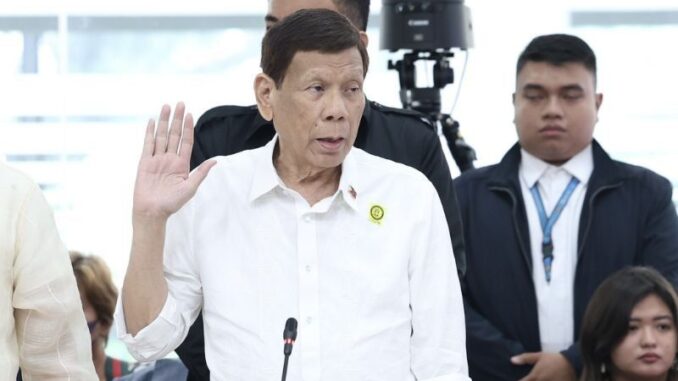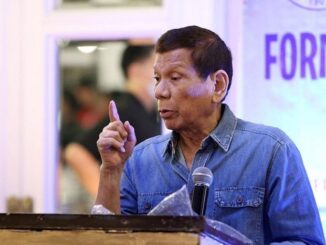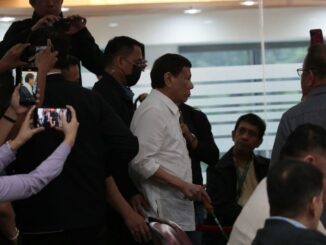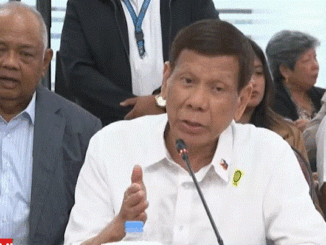
MANILA, Philippines — Former President Rodrigo Duterte admitted on Wednesday, November 13, that funds and incentives were provided to police officers who conducted anti-illegal drug operations.
At the House Quad Committee’s eleventh hearing, Duterte confirmed in Rep. Dan Fernandez’s (Santa Rosa, Lone District) line of questioning that the Office of the President requested an increased budget for the reward system.
“Mr. President, will you confirm that the Office of the President requested a larger budget for the reward system?” Fernandez asked in a mix of English and Filipino.
“That’s correct. You have to spend money for operations, for intelligence,” Duterte answered.
The former president claimed that police lack funding for day-to-day operations and rely solely on their salaries. For this reason, Duterte said he provided funds to the police, particularly for hostage and kidnapping operations.
“You really need to fund the police. Especially if there is a serious crime like kidnapping, you’re the one who will have to finance it,” Duterte explained in a mix of English and Filipino.
He added that even when he was president, and there were cases of kidnapping, he provided funds.
Funds for police operations under Duterte. The approved national budget for 2018 shows the Philippine National Police (PNP) was granted a total of P94.87 billion for the “conduct of police patrol operations and other related confidential activities.”
The budget was specifically allocated for operations against subversives, crime syndicates, and campaigns targeting kidnapping, human trafficking, smuggling, car theft, gunrunning, illegal fishing and drug trafficking.
Excess funds given to police officers
During the interpellation with Rep. Raoul Manuel (Kabataan Partylist), he was more direct in confessing the existence of a reward system when asked about the compensation provided to police officers for killing drug suspects.
“Reward? Correct. Very correct. Talagang totoo. At minsan bigyan ko pa ng dagdag (It’s really true. And sometimes I even give additional funds),” Duterte said.
This was his response after claiming that many local government units finance police operations, particularly providing funds for food and gasoline.
Duterte said that when police officers returned from an operation and reported excess funds, he would simply let them keep it.
“‘Pag may sobra niyan, … marami kayo sa team na pulis sasabihin nila na may sobra dito, kalahati,’Sige kunin niyo na ‘yun,’” he said.
(If there’s extra, … when the police team says there’s a surplus, I tell them, “Go ahead, take it.”)
The former president, however, backtracked later at the hearing saying that he never gave out rewards for killing drug suspects. Instead, he just gave funds for the anti-illegal drug operations.
When Fernandez asked about the reward system that retired police colonel Royina Garma, a former officer in Davao City and Cebu City, confessed to the joint committee, Duterte reiterated that he allowed officers to keep any unused funds.
RELATED: Royina Garma: Duterte sought my help for nationwide drug war reward system
Retired police colonel Leonardo Edilberto, a Duterte appointee like Garma, also confirmed Garma’s affidavits on the reward system in a previous hearing.
Still a reward for killing drug suspects
Rep. Bienvenido Abante (Manila, 6th District) contested Duterte’s argument, saying that a reward was still given when drug suspects were killed — an event that comes after an operation as Duterte said.
“Nagbibigay kayo ng reward nung napatay na hindi po para patayin. Iba po ‘yung reward na para patayin, iba rin po ‘yung reward ng nakapatay na siya,” Abante said.
(You give rewards not for killing, but for those who have already killed. A reward for killing is different from a reward for someone who has already killed.)
Duterte had little to say, stating only that the act “is not allowed.”
He was also evasive when Manuel asked if the drug war was financed through the Peace and Order fund, specifically the confidential and intelligence funds, telling the lawmaker it was “confidential” and not for discussion.
The eleventh hearing marked Duterte’s first appearance at the House Quad Comm to address allegations related to the reward system and extrajudicial killings, which are estimated by human rights groups to have reached 30,000.
He had also challenged the International Criminal Court to investigate him promptly, saying he was willing to face imprisonment if found guilty.





Be the first to comment